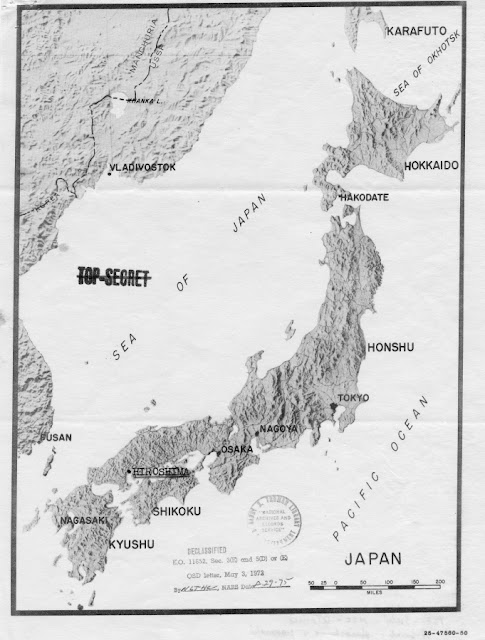Atlantic articles from the forties through the nineties explore the haunting question: Was the atomic bombing of Japan necessary?
The Atlantic Monthly | December 1946
"From this background I believe, with complete conviction, that the use of the atomic bomb saved hundreds of thousands—perhaps several millions—of lives, both American and Japanese; that without its use the war would have continued for many months; that no one of good conscience knowing, as Secretary Stimson and the Chiefs of Staff did, what was probably ahead and what the atomic bomb might accomplish could have made any different decision. Let some of the facts speak for themselves."
- -"All war is inhuman"- Compton makes the point that although people believe this act of dropping the Atomic Bomb on Japan was "inhuman", the entire war itself was inhuman. Japan attacking the United States at Pearl Harbor and killing thousands was "inhuman". Japan capturing China in the Raping of Nanjing was "inhuman". The dropping of the Atomic Bomb was just another way to try and end the devastating war.
- -"I cannot believe that, without the atomic bomb, the surrender would have come without a great deal more of costly struggle and bloodshed"- Dropping the bomb on Japan was the only way for the war to end quickly. If the bomb was not dropped, it was expected that the war would have dragged on for several months and "there would have been many more months of death and destruction on an enormous scale."
As President Harry Truman states in his diary, the Atomic Bomb was used purely for military use. The Japanese were given a warning and a choice to surrender. The United States did not blindly bomb the Japanese- With a given choice to surrender, the Japanese could have prevented the bomb from destroying their country.
- "The weapon is to be used against Japan between now and August 10th. I have told the Sec. of War, Mr. Stimson, to use it so that military objectives and soldiers and sailors are the target and not women and children. Even if the Japs are savages, ruthless, merciless and fanatic, we as the leader of the world for the common welfare cannot drop this terrible bomb on the old capital or the new [Kyoto or Tokyo].
- "He [Stimson] and I are in accord. The target will be a purely military one and we will issue a warning statement [known as the Potsdam Proclamation] asking the Japs to surrender and save lives. I'm sure they will not do that, but we will have given them the chance. It is certainly a good thing for the world that Hitler's crowd or Stalin's did not discover this atomic bomb. It seems to be the most terrible thing ever discovered, but it can be made the most useful."
"United States Strategic Bombing Survey: The Effects of the Atomic Bombs on Hiroshima and Nagasaki", June 30, 1946. Confidential File, Truman Papers.
- This article points out that "there is no doubt that the bomb was not the most importance influence among the people of these areas in making them think that the defeat was inevitable."
- "34 percent in other urban areas had reached a point where they felt unable to continue the war."
When Harry Truman learned of the success
of the Manhattan Project, he knew he was faced with a decision of unprecedented
gravity. The capacity to end the war with Japan was in his hands, but it would
involve unleashing the most terrible weapon ever known.Truman stated that his decision to drop the bomb was purely military. A Normandy-type amphibious landing would have cost an estimated million casualties. Truman believed that the bombs saved Japanese lives as well.
- The Japanese military command rejected the request for unconditional surrender
- August 6, 1945, (the US) dropped an atomic bomb on the city of HIROSHIMA. 70,000
Japanese citizens vaporized.
- Nagasaki on August 9, 1945...detonation of "Fat Man." The second atomic weapon used against Japan... resulted in the deaths of 80,000 Japanese citizens.
- Even the scientific community failed to foresee the awful effects of RADIATION SICKNESS.
- On August 14, 1945, the Japanese surrendered. The bombs brought an end to the most destructive war in history.
Draft statement on the dropping of the bomb , July 30, 1945. President's Secretary's File, Truman Papers.
- This statement was made three hours after the dropping of the Atomic Bomb on Hiroshima. It explains how powerful the bomb is and how it will affect the war as a whole. "What has been done is the greatest achievement of organized science in history. It was done under high pressure and without failure" (Truman).
- "Let there be no mistake; we shall completely destroy Japan's power to make war"(Truman).

- This picture from the President's Secretary files in the Truman Papers shows that Hiroshima, Japan was the city the Atomic Bomb was dropped on.
 |
| Memorandum from Chief of Staff Marshall to the Secretary of War, |
 |
| Enclosing "Memorandum of Comments on 'Ending the Japanese War,'" |
George A. Lincoln discussed war aims, face-saving proposals for
- problem of defining “unconditional surrender.”
- argued against modifying the concept of unconditional surrender: if it is “phrased so as to invite negotiation” he saw risks of prolonging the war or a “compromise peace.”
- those risks help explain why senior officials were unwilling to modify the demand for unconditional surrender


